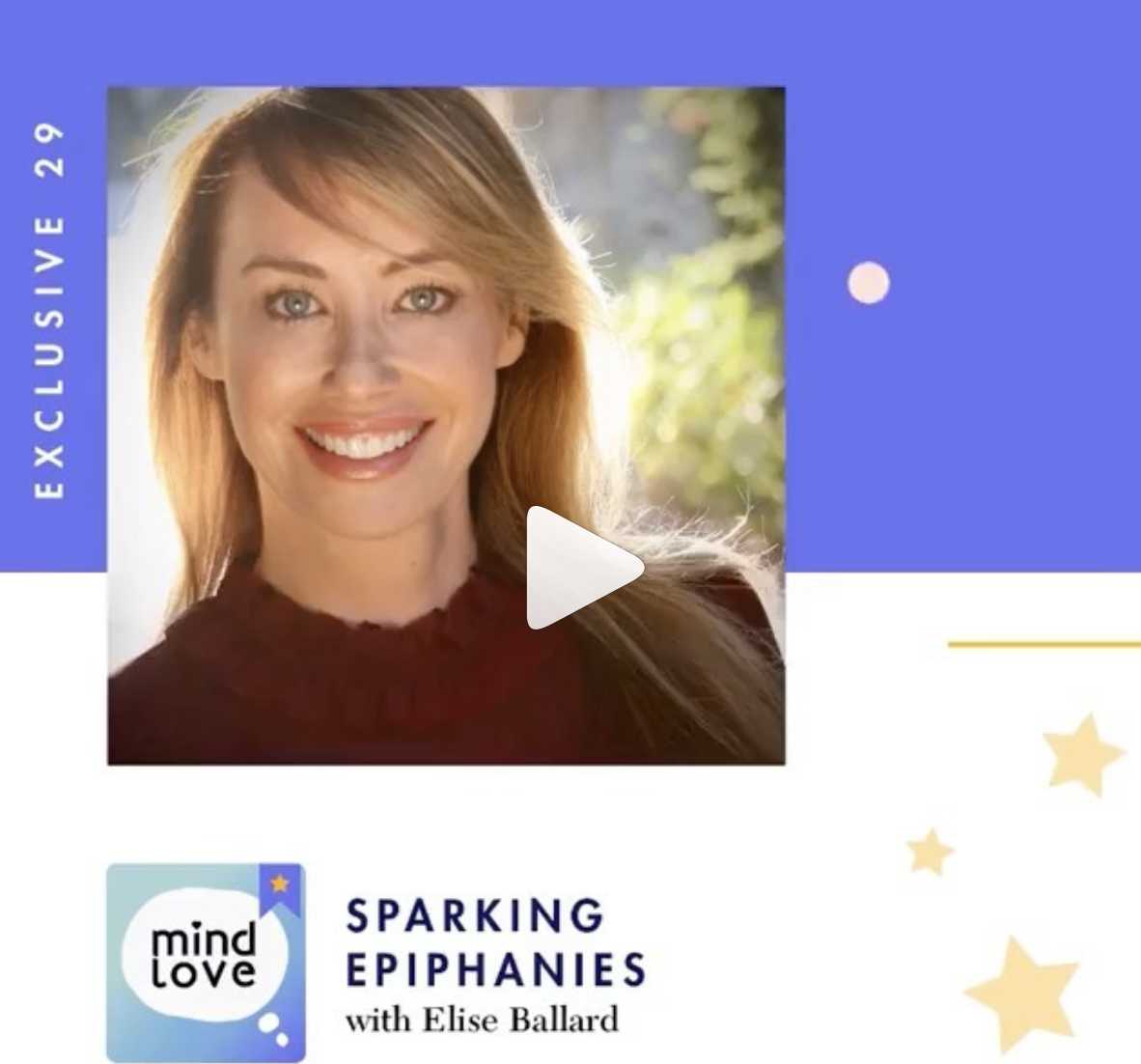Here at Epiphany Channel, we not only are reporting and sharing epiphany stories, but also information that we hope can help spark epiphanies.
Dr. Lissa Rankin is a fellow blogger on PositivelyPositive.com and she has a new book out called Mind Over Medicine: Scientific Proof You Can Heal Yourself. I’m a huge believer in utilizing both traditional medicine and complementary/alternative therapies to heal and stay healthy. Many of the epiphanies in my book such as Kate Milliken and Nancy Ballard‘s stories deal with healing. In fact, there is a whole section of the book dedicated to it.
I have found through my work with epiphanies that the beliefs and mind sets of the people who want to heal are ultra-important, and many times are the ultimate key to healing. Belief + Action. (Always taking action to support your beliefs!)
Lissa asked me to share some of the insights she shares in the book and I couldn’t be happier to do so. Here are 10 Health Habits we can all incorporate in our lives, complete with her commentary and an opportunity for a FREE online event she’s leading with Martha Beck (one of my all-time favorites!) — Happy Reading and Happy Healing! “See” you at the event!
10 Health Habits They Don’t Teach In Medical School by Lissa Rankin, M.D.
As a health-conscious person, you’re already in the loop about the importance of eating your veggies, skipping the booze, cigarettes, and fake foods, daily exercise, plenty of zzzzz’s, and regular check-ups. But as a physician fascinated by why some health nuts still suffer from chronic illness, I dug deep into the medical literature to study what else really makes us healthy – and what predisposes us to illness.
What I found shocked me. What I discovered was certainly never introduced to me in medical school. As I wrote about in my upcoming book Mind Over Medicine: Scientific Proof That You Can Heal Yourself and as I discussed in my latest TEDx talk, the scientific data proves that there are ten key habits that lead to optimal health. (I’ll bet your doctor never wrote these on a prescription pad!)
- Alleviate loneliness. The Italian immigrants of Roseto, Pennsylvania ate meatballs fried in lard, gorged on pasta, and smoked, but they had half the risk of heart disease as the rest of the country. Why? Researchers concluded that it was because they lived communally, celebrated regularly, and had a huge network of friends. Dinner party, anyone?
- Couple up. A UCLA study reviewed census data and found that those who never marry are 58% more likely to die at a young age than those who exchange vows. But only healthy marriages count if you’re seeking optimal health. Studies show that, when it comes to health, you’re better off alone than stuck in a toxic relationship.
- Get it on. Those with healthy, happy sex lives live longer, have a lower risk of heart disease and stroke, get less breast cancer, bolster their immune systems, sleep better, appear more youthful, enjoy improved fitness, have enhanced fertility, get relief from chronic pain, experience fewer migraines, suffer from less depression, and enjoy an improved quality of life.
- Engage in work you love. Those stuck in soul-sucking jobs are at greater risk for sudden death. In Japan, they call it “karoshi”- death by overwork. But it’s not just the Japanese who are at risk. Studies suggest Americans are at even greater risk of sudden death from heart disease and stroke due to overwork. If work is stressing you out, you may be shortening your life. However, when you’ve found your calling and are doing what you love, your nervous system relaxes, and this flips on your body’s natural self-healing mechanisms.
- Take vacations. Not only are vacations fun – they’re good for your health! Failure to use accrued vacation time has been associated with early death. One study looked at 12,000 men over nine years and found that those who failed to take annual vacations had a 21% higher risk of death from all causes, and they were 32% more likely to die of a heart attack. Another study found that women who vacationed once every six years or less were almost eight times more likely to develop coronary heart disease or have a heart attack than women who vacationed twice a year. So take time off – doctor’s orders.
- Express your creativity. We tend to dismiss the importance of creative expression in a society that devalues the arts as mere “hobbies” you can fit in after you’ve earned a living and spent quality time with your family. But expressing yourself creatively is a key tool for preventative health – or treatment of existing disease. Health benefits of creative expression include improved sleep, better overall health, fewer doctor’s visits, diminished use of medication, and fewer vision problems. Creative expression also decreases symptoms of distress and improves quality of life for women with cancer, strengthens positive feelings, reduces the risk of Alzheimer’s disease, reduces anxiety, and improves social functioning and self-esteem.
- Attend religious services. Individuals who attend religious services regularly live 7 ½ years longer (almost 14 years longer for African-Americans) than those who never or rarely attend religious gatherings. One study found that high levels of religious involvement were associated with lower rates of circulatory diseases, digestive diseases, respiratory diseases, and just about every other disease studied. But this is only the case if your religion is in alignment with your authentic self. If going to church or temple or the mosque relaxes your nervous system, it’s good for your health. But if it stresses you out, you’re better off staying home.
- Be optimistic. Seeing the glass half full instead of half empty doesn’t just make you more pleasant to hang around. Optimistic people are also healthier. Optimists fare better when suffering from cancer, recover better from coronary bypass surgery, enjoy healthier immune systems, and live longer than pessimists. People with a positive outlook are 45% less likely to die from any cause than negative thinkers (and 77% less likely to die from heart disease). If you’re ready to convert from pessimism to optimism, read Martin Seligman’s book Learned Optimism.
- Get happy. Happy people live up to ten years longer than those who are unhappy, depressed, or anxious. Depression increases your cancer risk, is a major risk factor for heart disease, and is linked to a variety of pain disorders, while chronic anxiety has been shown to increase cancer risk and carotid artery atherosclerosis, which predisposes to stroke. In a study of nuns, researchers found that 90% of the most cheerful nuns were still alive at age 84, compared to only 34% of the least cheerful.
- Meditate. Toxic relationships, work stress, pessimism, loneliness, and depression all trigger “fight-or-flight” stress responses in the body, and when the stress response is activated, the body’s natural self-healing mechanisms are flipped off. The average person experiences 50-100 stress responses per day, which, over time, poisons the body. But meditation can reverse this process. Harvard physician Herbert Benson studied “the relaxation response” that meditation induces and found it instrumental in treatment of conditions as wide ranging as cardiac arrhythmias, asthma, allergies, herpes, diabetes, ulcers, hypertension, infertility, PMS, AIDS, and chronic pain. Check out Leo Babauta’s tips for how to meditate.
Learn More In Mind Over Medicine
Make Your Own Diagnosis & Write Your Own Prescription:
What might be out of balance in your life? Which health habits might you adopt? What Prescription will you write to live a more optimally healthy life? Share your thoughts in the comments.
Lissa Rankin, MD: Creator of the health and wellness communities LissaRankin.com and OwningPink.com, author of Mind Over Medicine: Scientific Proof That You Can Heal Yourself (Hay House, 2013), TEDx speaker, and Health Care Evolutionary.
Join her newsletter list for free guidance on healing yourself, and check her out on Twitter and Facebook.









